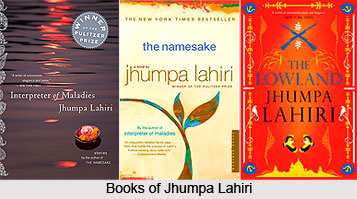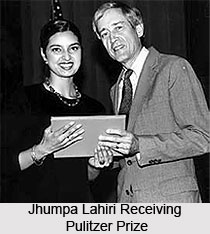 Jhumpa Lahiri is indeed the storyteller who weaves the lace of love, identity, crisis, lies and faults in a matured way. Her works are enriched with sensitive dilemmas of life. Characters in her books experience the cultural as well as the generation gaps. She, therefore, comments on the effects of western colonialism on Indians and Indians in Diaspora. Jhumpa Lahiri is not only a writer but the weaver of dreams and the fabricator of emotions. Her each and every novel becomes an outlet for her emotions.
Jhumpa Lahiri is indeed the storyteller who weaves the lace of love, identity, crisis, lies and faults in a matured way. Her works are enriched with sensitive dilemmas of life. Characters in her books experience the cultural as well as the generation gaps. She, therefore, comments on the effects of western colonialism on Indians and Indians in Diaspora. Jhumpa Lahiri is not only a writer but the weaver of dreams and the fabricator of emotions. Her each and every novel becomes an outlet for her emotions.
Early Life of Jhumpa Lahiri
Jhumpa Lahiri, a Bengali American author, was born in 1967 in London to a Bengali parent. She is the daughter of a librarian and schoolteacher. She moved to South Kingstown, Rhode Island, United States when she was child. Jhumpa Lahiri acquired her Bengali heritage from her mother at a very early age. She has always been inclined to creative writing. Jhumpa Lahiri received her B.A in English literature from Barnard College in 1989 and M.A in Creative Writing, Comparative Literature from Boston University. She also received her Ph.D. in Renaissance Studies from Boston University. She took up a fellowship at Provincetown`s Fine Arts Work Centre in 1997.
Right from a very young age Jhumpa Lahiri felt strong ties for her parents` homeland India, as well as the United States and England. A sense of homelessness and an inability to feel accepted took hold of her as she grew up with ties to all three countries. To her it is an inheritance of her parents` ties to India.
Writing Career of Jhumpa Lahiri
One can find the idea of exile throughout her work "Interpreter of Maladies". This collection of nine distinct stories revolves around the first and second generation Indian immigrants and the idea of otherness among the country. The story theme also includes the marital difficulties. It won "Pulitzer Prize" in 2000 for fiction. In addition, it received the PEN/Hemingway Award, the New Yorker Debut of the Year Award, an American Academy of Arts and Letters Addison Metcalf Award, the Transatlantic Review award from Henfield Foundation, the Louisiana Review Award for short fiction, the O. Henry Award for Best American Short Stories, and a nomination for the Los Angeles Times Book Prize. Guggenheim fellowship was awarded to her in the year 2002.

Jhumpa Lahiri made her debut as novelist with "the Namesake" in 2003. The story of the novel reveals the cultural and generational gaps between the parents and the children. The storyline revolves around parents born in Kolkata, West Bengal who have immigrated to United States, and their son, an American-born, wants to fit in amongst his fellow New Yorkers, despite his family`s unwillingness to let go of their traditional ways. Based on her novel, a film was also made.
Jhumpa Lahiri also wrote "Indian Holy Song" in 2000, "A temporary Prayer: What Happens when the Lights go out" in 1998, "Sexy" in 1998 and "the Third and Final Continent" in 1999.
Jhumpa Lahiri exploded onto the literary sense from 1999. In her short career no sign of slowing down appeared till date. Reader`s curiosity brings her audience together and they seem to be mesmerized by her writings. It is difficult to compare Jhumpa Lahiri`s work with other Indian or Indian-American authors. Lahiri is also able to draw her readers into the story through her details and by making her readers feel the emotional, physical, and mental needs of the characters.
Personal Life of Jhumpa Lahiri
Jhumpa Lahiri married Alberto Vourvoulias Bush in 2001. They have two children from their marriage.
Short Story Collections of Jhumpa Lahiri
* Interpreter of Maladies (1999)
* Unaccustomed Earth (2008)
Novels of Jhumpa Lahiri
* The Namesake (2003)
* The Lowland (2013)
Uncollected Non-fictions of Jhumpa Lahiri
* Cooking Lessons: The Long Way Home (6 September 2004, The New Yorker)
* Improvisations: Rice (23 November 2009, The New Yorker)
* Reflections: Notes from a Literary Apprenticeship (13 June 2011, The New Yorker)
 Unpublished Works of Jhumpa Lahiri
Unpublished Works of Jhumpa Lahiri
* A Real Durwan and Other Stories (1993)
* Only an Address: Six Stories by Ashapurna Devi introduced, translated and with critical commentary by Lahiri (1995)
* Accursed Palace: The Italian Palazzo on the Jacobean Stage (1997)
Other Contributions of Jhumpa Lahiri
* Introduction of the Magic Barrel: Stories by Bernard Malamud, Farrar, Straus and Giroux (2003)
* Introduction of Malgudi Days by R.K. Narayan (2006)
* Essay, Rhode Island (2008)
* Essay, The Suspension of Time: Reflections on Simon Dinnerstein and The Fulbright Tryptich (2011)
Awards Received by Jhumpa Lahiri
* 1993 - TransAtlantic Award from the Henfield Foundation
* 1999 - O. Henry Award for short story "Interpreter of Maladies"
* 1999 - PEN/Hemingway Award (Best Fiction Debut of the Year) for "Interpreter of Maladies"
* 1999 - "Interpreter of Maladies" selected as one of Best American Short Stories
* 2000 - Addison Metcalf Award from the American Academy of Arts and Letters
* 2000 - "The Third and Final Continent" selected as one of Best American Short Stories
* 2000 - The New Yorker`s Best Debut of the Year for "Interpreter of Maladies"
* 2000 - Pulitzer Prize for Fiction for her debut "Interpreter of Maladies"
* 2000 - James Beard Foundation`s M.F.K. Fisher Distinguished Writing Award for "Indian Takeout" in Food & Wine Magazine
* 2002 - Guggenheim Fellowship
* 2002 - "Nobody`s Business" selected as one of Best American Short Stories
* 2008 - Frank O`Connor International Short Story Award for "Unaccustomed Earth"
* 2009 - Asian American Literary Award for "Unaccustomed Earth"













